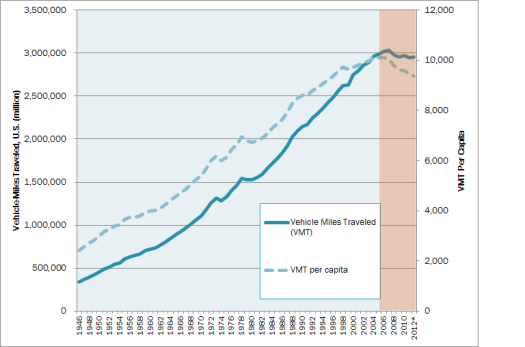Moving America Beyond Oil: A Brief Year-End Progress Report
Moving America Beyond Oil: A Brief Year-End Progress Report

theenergycollective
Five years ago I was defending a new report sponsored by NRDC, EDF, various government agencies and foundations, as well as the American Public Transportation Association, the Intelligent Transportation Society of America, Shell Oil and the Urban Land Institute. This report – Moving Cooler: An Analysis of Transportation Strategies for Reducing Greenhouse Gas Emissions – filled a huge analytical gap in transportation. While ample study has been made of the technical potential to reduce emissions by improving vehicle technology, there have been fewer comprehensive assessments of the potential to cut pollution by reducing traffic levels and improving the efficiency of the transportation system.
The report warranted defense from some advocates and analysts who were skeptical about its findings, namely that there is ample opportunity to save oil and reduce pollution by changing travel activity. The team of analysts and a steering committee chaired by yours truly examined about 50 policy tools that could reduce emissions in 9 different categories:
Pricing (e.g., tolls, pay-as-you-drive-insurance, VMT fees, carbon/fuel taxes);
Land use and smart growth;
Nonmotorized transportation (i.e., walking and biking);
Public transportation improvements;
Regional ride-sharing and commute measures;
Regulatory measures (e.g., reduced speed limits);
Operational/ITS strategies;
Capacity/bottleneck relief; and
Freight sector strategies.
Many of the results of the study make intuitive sense. For example, pricing measures can be quite effective especially if they provide a hefty disincentive for driving. And equity concerns about them (such consumption taxes are regressive) can be alleviated by funneling investment into viable alternative mobility options such as public transportation routes. And while pricing can be effective in the near-term, land use changes are very effective given a longer time frame. Some measures were surprisingly effective, such as programs to change driver behavior referred to as “eco-driving.”
We also performed some basic analysis of interactions between these measures by “bundling” them into 6 different combinations characterized by themes including “System and Driver Efficiency” as well as “Facility Pricing.” However, this is an area that still warrants more analysis especially at the metro regional level where the rubber hits the road.
This is also great time to take stock of progress, with a tremendous number of action in transportation and energy since Moving Cooler’s publication. First, the Obama Administration has made exceedingly effective use of the tools available to EPA and DOT to reduce carbon emissions and increase average fuel economy of America’s light-duty vehicle fleet. We assumed baseline progress in Moving Cooler, and the rules will drive fuel efficiency even faster and higher as we take the single biggest step possible to reduce pollution and save fuel.
Meanwhile, a variety of drivers (some policy, some economic, some demographic) are changing the vehicle-miles-of-travel (VMT) picture just as dramatically. VMT has grown reliably for decades, albeit at a decelerating rate. However, since 2006 it has plateaued both in per-capita and absolute terms as you can see from the graph below courtesy of Phineas Baxandall at U.S. PIRG who has done yeoman’s work studying this emerging trendline.

theenergycollective
